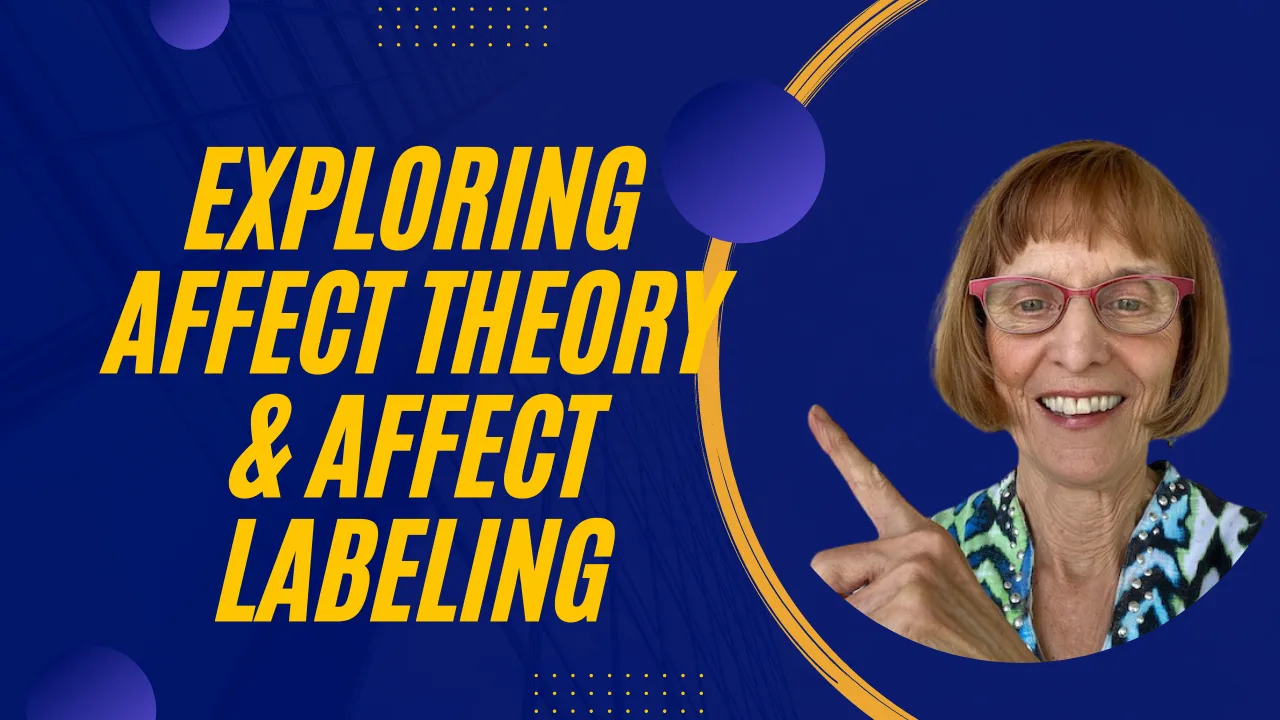The Power of Affect Labeling
Affect Theory's Central Blueprint for Intimacy and Communication explains the importance of expressing each affect to maximize the positive and minimize the negative affects. Affect Labeling is the perfect way to express each activated affect. There are tremendous benefits from putting affects and feelings into words or Affect Labeling.
Affect Labeling uses focused attention and awareness to understand consciously which affect activated in the moment. Affect labeling enhances brain integration; emotional regulation; and clears past, unresolved backed-up affects while it encourages positive affects. Self-awareness is developed through Affect Labeling.
Do you express all of your affects and feelings as they arise?

Want to make Affect Theory and Affect Labeling part of your human being toolkit? Be sure to get a copy of Conquering Trauma and Anxiety to Find Happiness. This personal narrative will explain the important strategies you can use to release past trauma and live anxiety free.
Affect Labeling offers a State of Calm and Joy
Affect Labeling can help relieve anxiety. Through Affect Labeling, our consciousness and awareness stays focused on the present moment and interrupts the fast emotional appraisal network where we perceive danger to allow the slow rational appraisal system to activate. Asking "How am I feeling?" can help this process along.
You can practice Affect Labeling by using simple sentences to name your affect. When you realize you fear something, all you need to say is "I am experiencing fear." Within several minutes, you will feel a release of the fear and find a sense of calm taking over with access to your rational brain. Joy activates when a negative affect lifts.
Can you name the nine affects so you can use them with Affect Labeling?
Affect Labeling Releases Backed-up Unresolved Affects
When we are not conscious of a negative affect in the moment, we allow the unresolved affects to form scripts and patterns to haunt us in the future. Often our backed-up affects add an emotional charge to a current situation making the present moment more difficult than it needs to be.
With Affect Labeling, we do not need to go into the past and uncover all the details. All we need to do is stay conscious in the present moment, identify negative affects when activated, and name those affects out loud. The most amazing part with this process happens when the past no longer has power over the present moment.
Did you ever wonder how you could stop overreacting to situations? Affect Labeling gives you the answer.
The Voice offers a Powerful Intervention
Tomkins recognized the power of language to magnify and focus us in the moment to develop awareness and consciousness. As social beings, we need language to build relationships so we heal from past trauma. The UCLA study on Affect Labeling documents subjects identifying 24 different vocalized feelings and emotions.
Each affect has its own vocalization. Affect Labeling verifies the power of the voice as a tool for expressing emotions. In fact, research has shown an area in the left brain where only spoken words are processed. Our brains are set up for us to use our voice to understand the emotions of others and our own emotions
How do you use your voice to share your affects, feelings, and emotions.?
Language Defines our Mental Health
Recognizing language as an important mental health tool offers ways to understand how we flourish as human beings. Empathy is the basis for developing speech in a baby. Through the relationship with their caregiver, each baby has a chance to develop a secure attachment and a desire to communicate so they learn empathy.
Social stimulation causes babies to smile. Reduce the stimulation and the baby stops smiling. We expect good or bad experiences with others based on our early experiences as babies. Storytelling and conversations can reverse any early difficulties as you change your brain through your voice and the words you choose.
Can you see the tie between your mental health, your experiences as a child, and how you develop relationships?
Feeling Stressed? Time to remove stress and anxiety from your life. Take advantage of Affect Theory and Affect Labeling through this personal narrative offering strategies to manage your inner self and emotional life.
